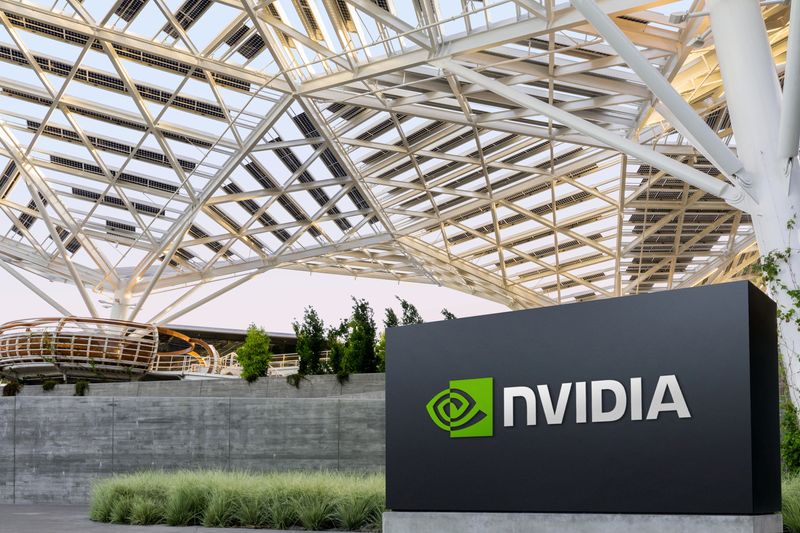By Arsheeya Bajwa
(Reuters) -Nvidia's quarterly forecast on Wednesday failed to meet lofty expectations of investors who have driven a dizzying rally in its stock as they bet billions on the future of generative artificial intelligence.
Shares of the chipmaker fell 6% in after-hours trading, weighing on shares of other chipmakers. The report has been seen as a day of reckoning for the tech sector and the results were treated as mixed, despite heady growth and profit.
"Here's the issue," said Ryan Detrick, chief market strategist at the Carson Group. "The size of the beat this time was much smaller than we've been seeing." He added, "Even future guidance was raised, but again not by the tune from previous quarters. This is a great company that is still growing revenue at 122%, but it appears the bar was just set a tad too high this earnings season."
The revenue and gross margin forecast for the current quarter were not far from analysts' expectations and failed to live up to a recent history of trouncing Wall Street's targets, overshadowing a beat on second-quarter revenue and adjusted earnings as well as the unveiling of a $50 billion share buyback.
In the last three consecutive quarters, Nvidia (NASDAQ:NVDA) recorded revenue growth of more than 200%, and the company's capacity to surpass estimates is at increasingly greater risk as each success prompts Wall Street to raise its targets even higher.
CEO Jensen Huang played up insatiable demand for the company's powerful graphics processors that have become the workhorses for generative AI technology such as OpenAI's ChatGPT. "You have more on more on more," he told analysts on a conference call, describing demand.
Huang confirmed media reports that a ramp-up in production of Nvidia's next-generation Blackwell chips was delayed until the fourth quarter, but downplayed the impact, saying customers were snapping up current-generation Hopper chips.
The company said it was shipping Blackwell samples to its partners and customers after tweaking its design, and that it expected several billion dollars in revenue from these chips in the fourth quarter.
Shares in chipmakers including Advanced Micro Devices (NASDAQ:AMD) and Broadcom (NASDAQ:AVGO) both fell nearly 4%. Asian chipmaker SK Hynix fell 4.5% and Samsung (KS:005930) was down 2.8% in Thursday morning trading in Asia.
INVESTOR JITTERS
Much hinges on this outlook from Nvidia, whose stock has surged more than 150% this year, adding $1.82 trillion to its market value and lifting the S&P 500 to new highs. If Wednesday's after-hours stock losses hold, Nvidia is set to lose $175 billion in market value.
The forecast could stoke fresh concerns about slow payoffs from generative AI investments, which some investors fear could lead tech giants to rethink the billions of dollars they are spending on data centers. These concerns have sent ripples through the AI rally in recent weeks.
Nvidia's biggest customers - Microsoft (NASDAQ:MSFT), Alphabet (NASDAQ:GOOGL), Amazon (NASDAQ:AMZN) and Meta Platforms (NASDAQ:META) - are expected to incur more than $200 billion in capital expenditures in 2024, most of which is meant for building AI infrastructure.
Shares of these companies dipped less than 1% in after-hours trading on Wednesday.
"It's a reflection of growing investor jitters about the long-term viability of the generative AI market, with the entire market seemingly hinging on Nvidia's performance," said eMarketer analyst Jacob Bourne.
Nvidia is also facing regulatory scrutiny about its practices.
The company said in its quarterly filing it has received requests for information from regulators in the U.S. and South Korea, regarding "sales of GPUs, our efforts to allocate supply, foundation models and our investments, partnerships and other agreements with companies developing foundation models." Previously the company had noted inquiries only from the EU, UK and China.
Reuters reported last month that France's antitrust regulator was set to charge Nvidia on alleged anticompetitive practices. A media report said earlier that U.S. regulators were probing whether Nvidia was trying to bundle its networking equipment with its sought-after AI chips.
Nvidia expects adjusted gross margin of 75%, plus or minus 50 basis points, in the third quarter. Analysts on average forecast gross margin to be 75.5%, according to LSEG data. It reported a 75.7% gross margin in the second quarter versus an average estimate of 75.8%.
Its gross margin still tops that of rivals, helped by the steep price tags attached to its speedy chips. AMD recorded an adjusted margin of 53% in its fiscal second quarter.
Nvidia forecast revenue of $32.5 billion, plus or minus 2%, for the third quarter, compared with analysts' average estimate of $31.77 billion, according to LSEG data.
Second-quarter revenue was $30.04 billion, beating estimates of $28.70 billion. Excluding items, Nvidia earned 68 cents per share in the second quarter, beating estimates of 64 cents.

Sales in Nvidia's data center segment grew 154% to $26.3 billion in the second quarter ended July 28, above estimates of $25.15 billion. From the first quarter, it increased 16%.
It also derives revenue from selling chips to gaming and auto companies.